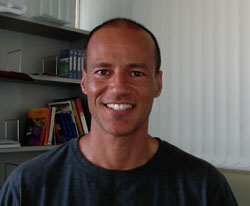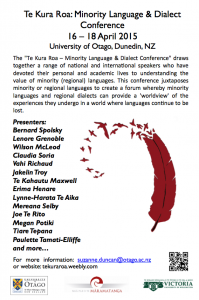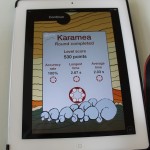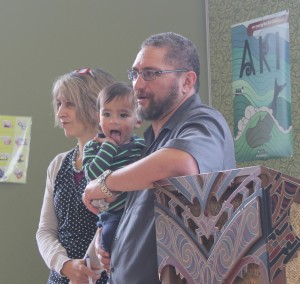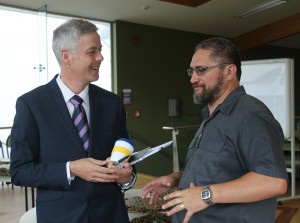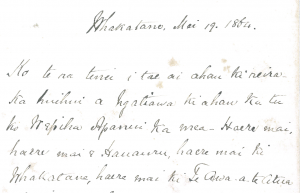Te Tumu postgraduate success
Featuring Malia Lameta & Te Ao Marama Tawhara. Six Te Tumu Masters-level students are graduating next week, with either Master of Arts, or Master of Indigenous Studies, showcasing our research strengths in the fields of Māori Studies, Pacific Island Studies, and Indigenous Development. Two are featured in today’s blog post, with more profiles forthcoming.
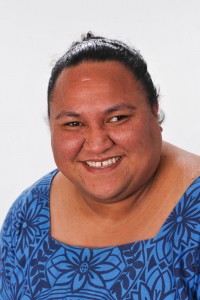 Malia Ellen Mamele Lameta (Samoan)
Malia Ellen Mamele Lameta (Samoan)
MA (Pacific Island Studies) supervised by Professor Michael Reilly and Dr Michelle Schaaf.
“I Am The Apple Of My Brother’s Eye” : An investigation into the evolving roles of Samoan women with particular reference to religion and gender relations.
[Click here to access the thesis]
Abstract: What does it mean to be a Samoan woman? The following thesis addresses this question by exploring the lived experiences of Samoan women with particular reference to religion and gender relations. Adopting an inter-disciplinary approach, it sheds light on the tenacity of socio-cultural and political factors that influence women’s roles and status. In particular, this research explores how Samoan women navigate the differing and often contradicting worlds of culture, Christianity, family, education, politics and gender. Information for this research was obtained through a series of interviews and literature analysis of primary and secondary sources. It has been the aim of this thesis to prove, not only to myself, but to those with a background and understanding similar to my own, that we, as women, are not inferior within Samoan culture. The participants’ words have been integrated throughout this thesis from Chapter One so as to emphasise and give strength to the voice of Samoan women. This thesis is centred on the inspiration and aspiration of these women and as a result, their testimonies have been brought alongside the literature as opposed to being supplementary. Women’s roles as sisters, wives and daughters are explored and the question is posed whether their cultural importance and status has been diminished by the influence of Christianity. From the evolution of women’s roles, to the changing meanings of the feagaiga, from the arrival of Christianity to the present day, women within Samoan society play a role that is imperative to the proper function of families, villages, districts and nation. The arrival of Christianity has not stripped us of our traditional importance but has increased and expanded our roles. We, Samoan women, are not oppressed, we are not suppressed; we have a voice, a place and dreams.
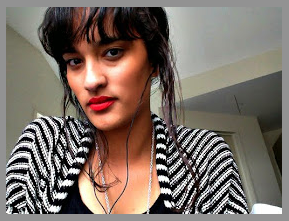 Te Ao Mārama Anna Maria Tawhara (Ngāi Tūhoe/German)
Te Ao Mārama Anna Maria Tawhara (Ngāi Tūhoe/German)
MA (Māori Studies) supervised by Dr Matiu Rātima & Associate Professor Poia Rewi.
Kia Māori te reo Māori? An investigation of adult learner attitudes towards the impact of English on te reo Māori
Abstract: This study sought to answer the following questions: What impact does the English language have on te reo Māori (the Māori language)? What attitudes do adult language learners have towards the impact of English on te reo? And what implications do these attitudes have for the revitalisation of te reo Māori? Engaging in in-depth semi-structured interviews with eight former University of Otago Māori language students from Te Tumu School of Māori, Pacific and Indigenous studies[1] (Te Tumu) forms a necessary part of this research project. Following Braun and Clarke (2008), the data gathered from the interviews was examined using Thematic Data Analysis.
The fundamental aim of this thesis is to explore and describe adult learner attitudes towards the impact of English on te reo Māori, so as to gain insight into how active language learners within Te Tumu perceive the influence of the English language. The thesis has two key foci, the first is parts of language, such as transliteration, code switching, pronunciation, grammar and idiom. The second is the impact of English within the context of teaching and learning.
On the one hand, this study shows that the participants view the impact of English as a form of contamination that is having a negative effect on Māori cultural concepts because there is less use of authentic Māori words and phrases, which in turn dilutes and minimises the representation and understanding of a Māori epistemological world view. On the other hand, some participants identified specific times when English language usage could be helpful to their developing proficiency in te reo Māori. The findings yield that there are certain exceptions such as the use of transliterations and code switching as being a necessary tool for scaffolding learning of te reo Māori particularly during the early stages of learning. The use of transliteration as a form of humour was also seen as acceptable. However, the main concern among the cohort was the maintenance of the authentic use of te reo Māori, more specifically, Māori lexicon, grammar, pronunciation, and idiom. Furthermore, the participants felt strongly about certain aspects of teaching and learning within Te Tumu that privilege Pākehā teaching methods[2] such as the grammar translation method and a lack of attention to tikanga Māori (Māori culture) and Māori centred pedagogies. The findings from this study show definitively that the participants feel that the language is in a state of contamination, on the other hand they are also concerned that there are times where transliteration and code switching can be necessary, even useful.
[1] See http://www.otago.ac.nz/tetumu/ for further information about the University of Otago department of Māori, Pacific and Indigenous studies.
[2] By Pākehā methods of teaching I am referring to the pedagogical teaching practices that favour the use of the English language.
Attitudes of NZ youth to Māori-language revitalization
What do young people think about the future of te reo Māori?
Nathan Albury is undertaking research on “folk linguistics”, that is, what do ordinary people think about language use. Nathan was formerly here at Te Tumu, but is now close to completing his PhD at the University of Oslo on folk linguistics relating to the revitalization of te reo Māori in New Zealand, and the Saami language in Norway. Te Tumu’s Dr Lyn Carter remains as one of his supervisors.
Nathan has recently written a short pamphlet with some of his findings relating to te reo Māori. He has circulated it to government departments and political parties. In particular he has had a good response from Education Minister Hon. Hekia Parata, and from the Green Party. Click on the link to read Nathan’s pamphlet.Tō Tātou Reo
Te Tumu academic wins Ngā Pae Fulbright visiting scholarship
Congratulations to Dr Matiu Rātima, one of our Māori-language kaiako, who has recently been awarded a Ngā Pae Fulbright visiting scholarship to undertake research at the Mānoa campus of the University of Hawai`i, in Oahu. Matiu will be away from 10 August 2015 to 10 January 2016 during his Research and Study Leave.
While in Hawai’i where he’ll be working with Dr Keao Nesmith of the Kawaihuelani Center for Hawaiian Language on their research project titled, “Communicative Language Teaching for Indigenous Language Revitalisation”.
Globally there are few indigenous languages that are not under threat of decline or extinction. It has been estimated that of the world’s 6,912 known languages, 95% of these are spoken by less than 6% of the population. Experts forecast that less than 10 percent of the world’s living oral languages (in the year 1992) will still be spoken by 2092. Urgent action, underpinned by good research, is vital to stop this decline.
Matiu’s research will examine four key questions.
1. How are indigenous languages being taught within universities?
2. What pedagogies are being applied?
3. What constitutes ‘best practice’ in indigenous language teaching? And;
4. How can Communicative Language Teaching help to produce speakers of indigenous languages?
The research focuses on three case studies, the teaching in universities of the Māori, Hawaiian and Tahitian languages.
Fulbright New Zealand promotes “mutual understanding between the peoples of New Zealand and the United States of America by means of educational and cultural exchange”, and offers a range of grants for New Zealand academics and graduates to research in America.
Te Kura Roa: Minority Language & Dialect Conference
We are excited to announce the Te Kura Roa: Minority Language & Dialect Conference that will be hosted by Te Tumu: School of Maori, Pacific and Indigenous Studies at the University of Otago, Dunedin, 16-18 April 2015. Come along and listen to researchers and expert practitioners of minority and regional languages from around the world and Aotearoa/New Zealand, for what we hope will be an engaging and focussed forum. We see this conference as being of particular interest to minority language teachers and their students, researchers of linguistics and languages, policy makers, iwi/hapu language strategists and of course speakers of minority languages and dialects.
Te Tumu launches “Aki”.
Te Tumu has launched “Aki”, a new I-Phone game for learning Māori-language vocabulary. The game can also be played on I-Pads.
This project was headed by Associate Professor Poia Rewi of Te Tumu and Dr Katharina Ruckstuhl from Research and Enterprise. The game is informed by research by Te Tumu postgraduate students Nikita Hall and Kelly-Ann Tahitahi. Technical input from Design for Technology staff and students. Te Tumu students also assisted with the voices for the app. Learners will be able to increase their vocabulary (principally items and activities related to the home) while also competing with their friends. An Android version is currently being created.
Kua whakamānutia e Te Tumu he kēmu Ī-Waea (ko “Aki te ingoa) hei ako i ngā kupu reo Māori. E pai ana hoki te pūmanawa tautono (app) mō te Ī-papa. Ko Associate Professor Poia Rewi (nō Te Tumu) rāua ko Dr Katharina Ruckstuhl (Research and Enterprise) ngā kaihautu. Nā ētahi ākonga paerunga, nā Nikita Hall rāua ko Kelly-Ann Tahitahi te rangahau mō te kēmu nei. I whakatutukitia te taha hanga kēmu e ngā kaiako me ngā ākonga o Te Toki a Rata (Design for Technology), ā, nō ētahi o ngā ākonga o Te Tumu ngā reo e rangona ana. Ka taea e ngā tāngata e ako ana i te reo te whakarahi tō rātou mōhio ki ngā kupu reo Māori (e pā ana ki ngā taputapu me ngā mahi o te kāinga), ā, ka whakataetae rātou ko ō rātou hoa. Kei te hangaia he tūmomo Android ināianei.
Story from the Otago Daily Times.
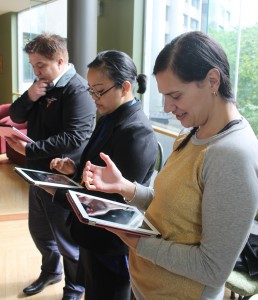
Gareth Seymour (nō Te Taura Whiri i te Reo Māori) rātou ko Migoto Eria (nō Te Whare Taoka o Ōtākou) ko Dr Karyn Paringatai (nō Te Tumu) e purei ana i te kēmu.
Seminar: The Folk Linguistics of Māori Language Revitalisation
Nathan Albury, PhD student, will be giving a seminar in Te Tumu on 2.30-3.30pm, Tuesday 18 November in R3S10 (3rd floor, Te Tumu). Please note that this is a different day and venue to usual.
Nathan’s paper, The Folk Linguistics of Māori Language Revitalisation, “applies the folk linguistics of language policy in respect to language revitalisation as a policy project. It reports preliminary findings from research that sought to compare what young indigenous and non-indigenous youth in contemporary New Zealand claim to know about language revitalisation as a policy process, what attitudes and beliefs these youth have towards activities and themes aimed at revitalising the Māori language, and how their knowledge and beliefs manifest into folk linguistic performance when these youth are positioned as hypothetical language policy bosses of the New Zealand government.”
For the full abstract click here, or on the “Seminars” page on the left
Māori-language research in Teaching
It is always good when students can use their skills and research to produce a resource to benefit the university. MAOR427 “He Tuhituhinga” is a 400-level Māori history paper that looks at historical Māori-language texts. All the work and discussion is conducted in the Māori language. This year one of their assignments was the translation of a text, selected by Jeanette Wikaira, Kaituhituhi Ratonga Māori at the Hocken Library, was an account by Hauāuru Taipari of Ngāti Maru about a visit to Ngāti Awa and Whakatōhea in 1864. The students divided the text up, and transcribed and translated it. This was then given back to the Hocken Library as an accompanying resource to the original text.
He mea tino pai kia whakamahia e ngā ākonga ō rātou pūmanawa me tā rātou rangahau hei whakaputa mai i te rauemi, hei painga mō te whare wānanga. He pepa hītori, he pepa tau-tuawhā te pepa MAOR427 “He Tuhituhinga” e āta tirohia nei ētahi tuhinga reo-Māori o neherā. E mahia ana ngā mahi katoa i roto i te reo Māori. He mahi whakapākehā tētahi o ngā aromatawai. Nō te tau nei, ka whiriwhiria e Jeanette Wikaira, e te Kaituhituhi Ratonga Māori o te Uare Hākena te tuhinga nei, nā Hauāuru Taipari o Ngāti Maru i tuhi mō tāna haere ki a Ngāti Awa rāua ko Whakatōhea i te tau 1864. Wehewehea ana te tuhinga e ngā ākonga, tuhia ana ngā kupu Māori ki te rorohiko, whakapākehātia ana. Kātahi ēnei ka tukuna atu ki te Uare Hākena hei tākoha, hei rauemi hoki i te taha o ngā kupu ake a te kaituhi.
New book on the value of the Māori Language
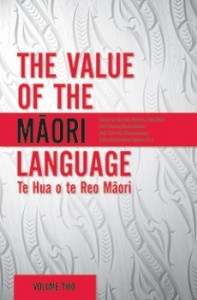 Te Tumu staff member, Associate Professor Poia Rewi and Professor Rāwinia Higgins of Te Kawa a Māui (Victoria University of Wellington) have released an edited collection, The Value of the Māori Language: Te Hua o te Reo Māori, with Huia Publishers. The book features 25 essays from an illustrious field of Māori commentators, responding to the question ‘What is the value of the Māori language?’ more than twenty five years after the passing of the Māori Language Act.
Te Tumu staff member, Associate Professor Poia Rewi and Professor Rāwinia Higgins of Te Kawa a Māui (Victoria University of Wellington) have released an edited collection, The Value of the Māori Language: Te Hua o te Reo Māori, with Huia Publishers. The book features 25 essays from an illustrious field of Māori commentators, responding to the question ‘What is the value of the Māori language?’ more than twenty five years after the passing of the Māori Language Act.
The book was launched recently in Wellington at an event attended by many of the big names of Māori-language education.
This publication is one output emerging from Poia and Rāwinia’s three-year project, Te Kura Reo – Waiora, research funded by Ngā Pae o te Māramatanga.

